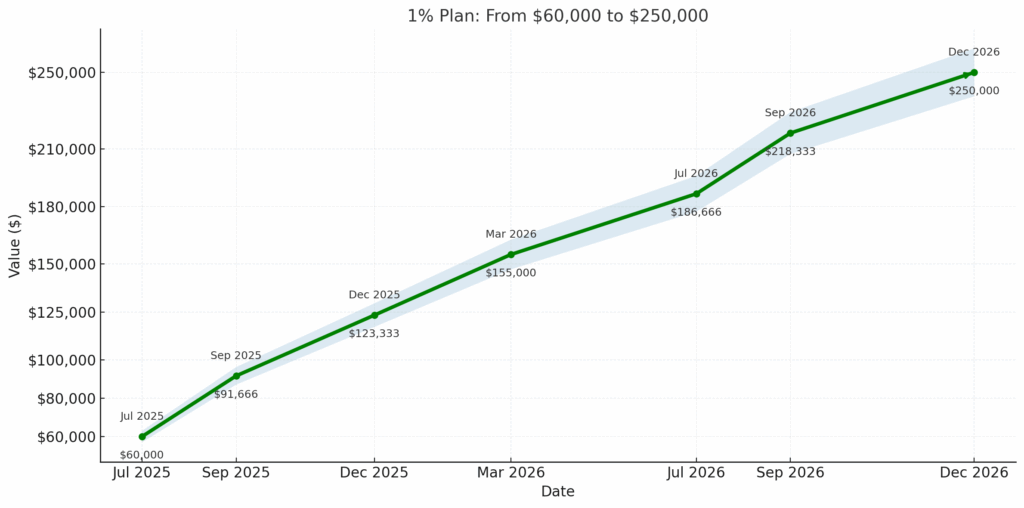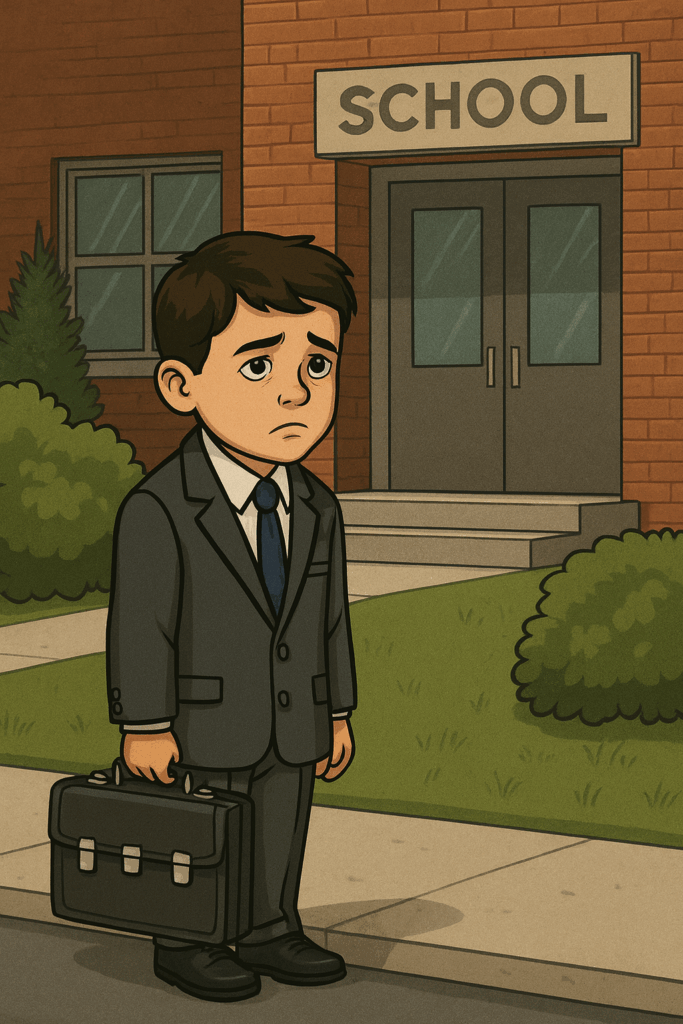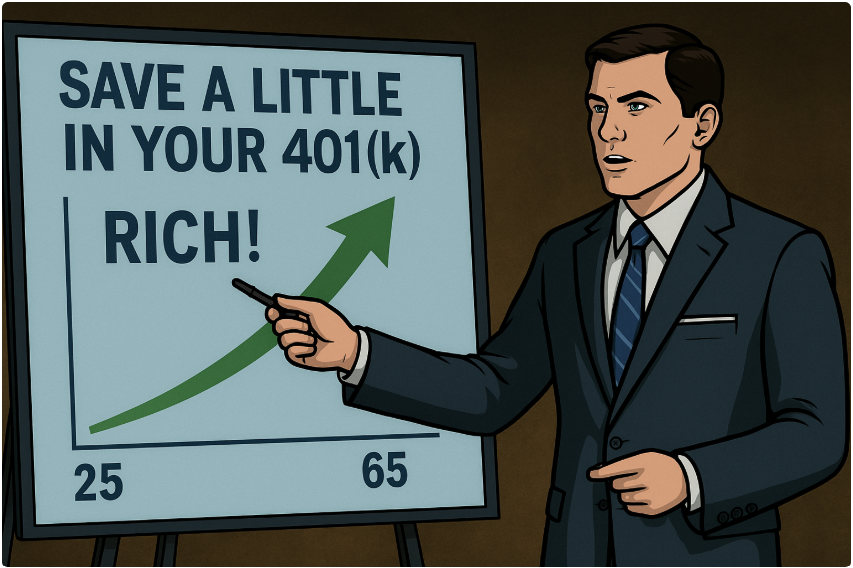Part Two: Why is this 18 month project so important to me?
In part 1 of my 3 part Why? series I wrote about why I launched this blog.
In part 2, I dig into why this 18 month project is so important to me.
As a refresher, the 18 month plan began on July 1 of this year. The ultimate goal is a version of financial freedom – a system generating $2,500 per week free and clear by December 31, 2026.

How does the 1% System work?
- Begin with $60,000.
- Build a platform of weekly covered calls, dividends and Index Trading.
- Make a 1% return each week.
- Withdraw any funds above that week’s 1% goal number.
- Set milestone goals – $100,000 (December 31, 2025), $250,000 (December 31, 2026).
What’s the objective?
The goal is to generate $10,000 per month ($2,500 per week) free and clear by December 31, 2026.
Why?
$10,000 per month is a number I could live on if my professional life fell apart.
So, why is this so important?
To answer that question, I have to go back, back to 2 different times in my life – (i) the 80’s, my early childhood & (ii) the 00’s, my early adulthood, aka the Summer I turned pretty.
1. 1980’s – Early Childhood
I grew up in the 80’s in the “Valley” (yeah, that Valley) and all in all a pretty normal childhood, but that doesn’t mean I was a pretty normal child.
My favorite TV character was Alex P. Keaton from Family Ties and I carried a briefcase to school.
Also I wondered why I felt different from everyone else, who seemed happy and comfortable. I was always desperately seeking for an identity. I was basically having an existential crisis from age 4 to 13.
Which came first – the anxiety or the briefcase? Age old mystery.

Age 13
At 13 I was diagnosed with a malignant brain tumor. If you want to feel even more isolated and different than everyone else, get diagnosed with a malignant brain tumor.
The (8) College(s) Years
I could probably trace the origins of my compulsion to out-succeed, out-perform and seek constant validation to the time period from the cancer diagnosis at age 13 to graduating from college at age 25.
At some point in there was a transition from just trying to stay alive to “um, what am I going to do with my life” and that landed me in Colorado for college. Colorado seems like the right state for someone with this mindset.
And I hated Colorado. It was cold, amongst other problems, and there were many problems and I left that school after 2 years with a 2.0 GPA. It’s worth noting here that I have a relatively high IQ – 250 I think, not sure – but never performed well in school.
In fact years ago I was handed a box of my elementary school stuff, and the report cards almost all had some version of these words – great potential, doesn’t work hard, talks in class.
Back to the point, Colorado was a disaster and I did what any 20 year old would do – I moved back in with my parents.
I will fast forward here – living at home, totally lost, 2.0 GPA and one day I saw a little movie I will call Jerry Maguire. I knew, for some reason, that I wanted to be a sports agent and for some other reason I figured going to USC would be my fastest route.
Emboldened and refreshed, I picked myself up, dusted myself off, enrolled in junior college, marched into the Counselor’s office, laid out my plan for the old fox and you know what the guy said to me?
You’ll never get into USC.
If you want to get to me to do something, even something I don’t really want to do, tell me I can’t. So I spent 2 years there, got a 4.0, volunteered at USC before I was even admitted and guess what? Well, you can guess.
And while I did get into USC and I am extremely proud of that and I truly love and appreciate that University, there is this voice that enjoys chirping up now and then and reminds me that I didn’t go to Harvard. I try not to listen to that orchestra too much, but every once in a while the low thinking gets first chair.
So there is the origin of some of my competition against the world.

2. 00’s – Early Adulthood
My time at USC was a dividing line between childhood and adulthood, like a really expensive, 4 year Bar Mitzvah.
I am never the smartest person in the room (I don’t actually believe my IQ is 250) but I will outwork just about anyone.
I put in the work at USC, working a part-time job, maintaining a full course load, interning in the Sports Information Department and in my final year, also interning for a new soccer team called the LA Galaxy. It was this internship that led to my career – first selling season tickets and then being offered the Operations Director position literally the day after graduation.
That led to a position overseeing the new stadium, the Home Depot Center as it was known and between those 2 positions, those 7 years were probably the best 7 years of my career (so far).
Somewhere along the way I decided I wasn’t paid enough, I wasn’t being promoted fast enough, didn’t they know who I was kind of thing and by the summer of 2006 I took a position as Executive Director of a tent company. Like big tents, not camping tents. Big or small, this was not a good decision.

This was also the first one of many, many short-sighted decisions, many of them around money. I was always chasing money. I never wanted to work for the money, save the money, be smart about the money, I just wanted the money.
You know how some 401k advisor would come in every so often and tell you how if you just save $50 a week for 4,000 weeks you’ll be rich? I would always start that process and then withdraw and go to Vegas within 3 months.

When l went to the tent company, I figured I could always get back into sports if I didn’t like that job. And I didn’t like that job. And I couldn’t get back into sports, not for a long time anyway.
I have written elsewhere about leaving that job and spending a year trying to live as a professional triathlete but giving up on that way too quickly as well.
In 2009 I ended up back in professional sports, first with the United Football League, a league that was going to take on the NFL. Note: they did not take on the NFL.
From there, I took a position with the North American Soccer League, overseeing business operations for the League and basically being sent each week to whatever team in whatever city needed help. That was probably my second favorite job of all time and for the first time – travel. Lots of travel. Hundreds of thousands of miles of travel. And with the travel, came the drinking. Lots and lots of drinking.

And in 2017 it all came to a head. I met the woman who would become my wife on an airplane. After years of travel and drinking I couldn’t do it anymore, I’d always known I’d had a problem, but for the first time I admitted that my life was unmanageable. And on July 2, 2017, I sat on her couch, looked her in the eyes and said I will never drink again.
I didn’t not mean those words, I didn’t not mean those words; I just don’t know how or why I said them. Either way, I stopped. And haven’t felt the need to drink since.
And on May 2, 2020 we got married.

That’s a neat story, but how does it apply to the 1% Plan?
There are themes woven through my childhood and adulthood – themes of inadequacy, depression and some compulsion not only to prove to you that I am great, but my need for you to tell me it’s so. I have long sought that validation and it manifests in so many ways, so many of them unhealthy.
Getting rich quick is one of them. In fact, the concept that there is some number, some dollar amount, some perfectly balanced spreadsheet is another one. It’s no different than my need to win races and the depression I have felt at being sidelined by injury. They are all water from the same well, all some version of:
If only X happens, then I will be happy.
Insert $250,000 or top 3 in my Age Group at a 70.3, or a new car, or, or, or, or. They are all nonsense. And since 2017 I have been able to operate with some level of clarity and been able to see the insanity of such thinking. So that’s not what the 1% Plan is about.
The 1% Plan is important to me because it is something that I have refined over 10 years and it works. I have been able to 2x & 3x my capital stack in a year through slow, calculated decisions and the only way it fails is when I fail.
When I deviate from my own rules, when I let that same voice, the one that tells me I am not good enough take over and it convinces me that if 1% a week is good, well surely 3% is better.
This blog is important to me because in logging my weekly activity with total transparency, wins and losses, in holding myself accountable, in memorializing my rules and the system itself in painstaking detail, I know not only am I going to succeed but I know for a fact that I cannot be the only 50 year out there thinking these things.
In the short time I have been writing this, I have had people reach out to me, looking to do the same thing. I have also had someone in particular thank me for being honest and transparent about the losses, and the wins.
So why is this all so important to me? Because maybe after 50 years of looking, that kid with the briefcase found what he was searching for.
